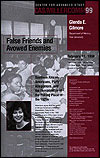False Friends and Avowed Enemies: Southern African Americans, Party Allegiances, and the Feminization of the Polling Place in the 1920s
Third Floor, Levis Faculty Center 919 West Illinois Street Urbana
Historians agree that the switch of African Americans from the Republican to the Democratic Party in the 1936 election is one of the major events in twentieth century U.S. politics. By tracing the roots of that switch to the South and to the passage of woman suffrage, Gilmore argues that the history of this most famous political realignment resulted from a racialized and gendered political culture. Southern African Americans, especially women, decided to leave the party of Abraham Lincoln long before the party of Franklin Roosevelt bid them welcome. That decision had resounding consequences for American politics for the remainder of the century.
Hosted by: Afro-American Studies and Research Program
In conjunction with: Department of Educational Policy Studies, Department of History, Department of Political Science, Department of Sociology, Illinois Program for Research in the Humanities, Women?s Studies Program, La Casa Cultural Latina, University YWCA
Department of History, Yale University

